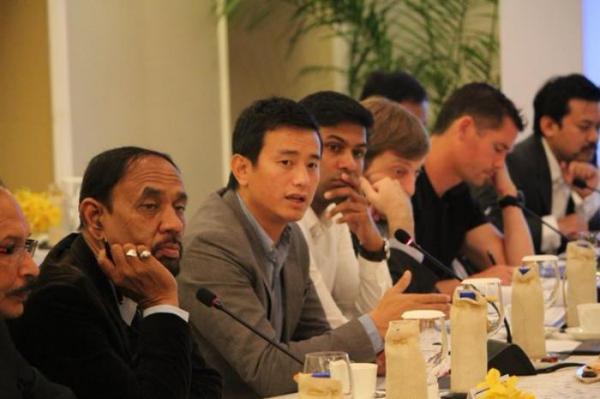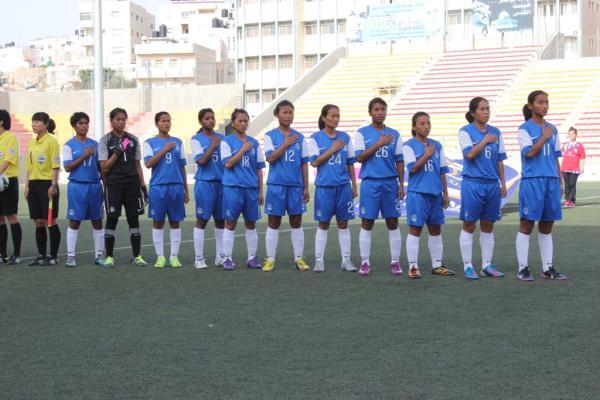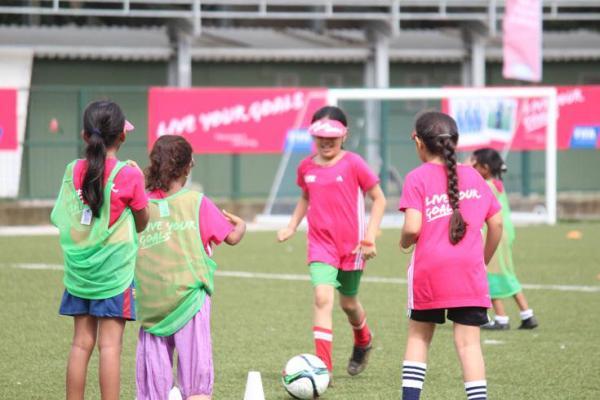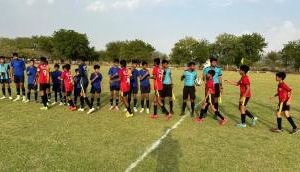
- The 21st Senior Women\'s National Football Championship kicked earlier this month, 11 months after it was initially scheduled to be held.
- The women\'s game in India suffers from a handful of problems at present: apathetic administrators, financial struggles of players and the absence of a professional structure being some of them.
- With the men\'s game being given priority over women\'s football, the latter has remained stagnant for a few years.
The 21st Senior Women's National Football Championship, India's premier football competition for women, got underway on 12 December. Initially scheduled for January, the tournament was indefinitely postponed without notice, before the All India Football Federation (AIFF) finally announced on 4 December, eight days before the start, the new dates for the 2015 edition.
In the last 55 months, only one edition of the tournament has been held. It speaks volumes about the level of apathy being shown towards the women's game by the country's football administrators. In 2012 and 2013, the AIFF didn't bother with holding the tournament, despite regularly spending seven figure sums on their executive committee meetings.
This time, the first stage of the tournament is being held in five different venues across the country. The competition will then move into a final round, where the winners will be decided. However, as another year draws to a close, AIFF has once again failed to put into place a proper roadmap for the women's game.
AIFF - a governing body for men?

Photo: AIFF Media
The governing body's indifferent attitude has meant that women's football in India continues to struggle for survival, with a professional structure nowhere near in place. AIFF published the 2014-17 Strategic Plan last year, and promised to revamp the women's game in the country.
The report published by the body explained that a national league for women would be launched in 2015, with a restructuring of the women's football department and preparation of a developmental plan to be done in 2014 itself.
As we reach the end of 2015, there is still no blueprint in place for a national league. In fact, the budget for the same plan has no money allocated for a women's league, which probably explains why the AIFF has failed to walk the talk since the publication of the report.
In comparison, the AIFF spends a little over 25 per cent of the entire budget on itself. So while the country's female footballers continue to be robbed of a professional football league, the governing body continues to hold meetings and press meets in five-star hotels, with some of the top-brass receiving exorbitant salaries for carrying out the operations of the board in this manner.
It begs the question: is the AIFF an organisation that only cares about the interests of the men's game. Looking at the evidence, it's difficult to say no.
Also read: How Tibetan women in exile are using football to fight sexism
A neglected women's national team
The Indian women's national team is ranked 57th out of 147 active teams in the FIFA world rankings. Compared to their male counterparts, who languish at 166 among 209 nations, the women's team holds a much more respectable position, internationally.
However, the national team has been lucky to have whatever little international exposure it has had in recent years. Such has been the level of neglect that the Indian women's team was removed from the FIFA world rankings in 2009 after AIFF failed to organise a single international game for them for over 18 months.
For over two years, AIFF has failed to organise a single international friendly for the team, resulting in India participating in major events with minimal preparation. Last year, India suffered humiliating 10-0 defeats at the hands of South Korea and Thailand at the Asian Games, which highlighted the ill-preparedness of the team.
India did manage to come back and win the SAFF Women's Championship with ease, but there is no doubting the fact that the gulf between India and other continental giants wouldn't have been so great had proper exposure been provided to the players throughout the year.
Bembem Devi is the captain of the Indian national team, and is widely regarded as the greatest ever Indian woman footballer. Speaking to Catch, she says, "The women's team definitely needs more international exposure. We need to play international friendlies, and that is something we have raised with the AIFF as well.
"We did go to China for an exposure trip before the Asian Games, but after last year's SAFF Championships, we haven't had any international action, barring the Olympic qualifiers, which has probably affected our ranking as well."
Also read: Would love to return to India if professional league kicks off: West Ham's new signing Aditi Chauhan
Football - a misogynistic industry?

Photo: AIFF Media
When it comes to indifference towards women's football, it isn't restricted towards the action on the field. The same also extends to other sectors of the sport. Coaching, for instance, remains a male-dominated profession; more so in India.
Disha Malhotra is the CEO of Foot and Ball, a Delhi-based organisation that provides football coaching to young hopefuls. She is also a former national team player, and in the recent Women in the World Summit organised by the New York Times, she was selected as one of the 20 'Emerging Women Leaders in India'.
Malhotra admits that female coaches find it hard to make a career in the sport. "Football, at present, remains a male-dominated sport. When it comes to coaching, there is a stereotype that male coaches will be better than women. There is also discrimination in pay towards coaches of the two genders in some situations," she laments.
"The AIFF, as well as all the state associations, should encourage more women to take up coaching as a profession. If you manage to increase the number of female coaches, it will, in turn, have a positive rub-on effect on the number of women participating in football," she adds.
Also read: Aditi Chauhan: Why India needs to help the promising goalkeeper
The ugly reality of the beautiful game
Today, quite a few players in the national team have government jobs to help them earn a living, something that professional football in India still doesn't allow them to do so. It becomes especially hard for players who don't come from financially sound backgrounds, to carry on playing the sport.
Rashmita Patra was part of the Odisha team that had won the national championship in 2011. She even featured in the Indian national team, and had a bright career in front of her. However, in three years' time, she ended up opening a small betel shop in the streets of Aul, Odisha, as poverty forced her to give up football.
Rashmita is not a one-off case. The absence of a professional structure means that many female footballers are forced to give up a career in the sport. Disha Malhotra says a major structural over haul is needed for the women's game to grow in India.
"Many steps need to be taken to change this scenario. We need more quality women coaches in the game, an increased player participation, and more importantly, we need to encourage girls to start playing football from very early on in their lives. There needs to be a proper structure for the game at the school and college level.
"A professional club structure in every state, a national women's football league and increased pay to national team players will go a long way in improving the current state of affairs," she says.
Also read: Remembering Rahim Saab, the man who put India on the world football map
The road ahead

Photo: AIFF Media
"The biggest problem with women's football today is the lack of sponsors, which has been a big hindrance in the creation of a national football league. We have spoken to AIFF on many occasions regarding a new league, and they have promised to look into it," says Bembem Devi.
"Lack of finances has prevented AIFF from delivering us a national league, as was promised last year. However, I am confident that AIFF will be able start it by 2016," the legendary footballer says.
While AIFF is not the strongest of sports bodies financially, what is really surprising is its unwillingness to cut down on its own extravagant spending and allocate some of the money from the annual budget to a women's league.
The ongoing national championship has been hastily held after months of indecisiveness on the same. "The SAF Games will be held in February, so it was important to hold the tournament as the squad will be selected on the basis of their performances in the national championship," an AIFF source told Catch.
It remains to be seen whether the governing body manages to start a women's league next year. However, for any change to take place in the women's game, there needs to be a major organisational overhaul at AIFF itself. As long as the federation does not bring in changes in the way it operates, it may be too much to expect changes in the domestic game.
Also read: How Mizoram became one of India's best performing football states
First published: 22 December 2015, 6:29 IST







![BJP's Kapil Mishra recreates Shankar Mahadevan’s ‘Breathless’ song to highlight Delhi pollution [WATCH] BJP's Kapil Mishra recreates Shankar Mahadevan’s ‘Breathless’ song to highlight Delhi pollution [WATCH]](https://images.catchnews.com/upload/2022/11/03/kapil-mishra_240884_300x172.png)

![Anupam Kher shares pictures of his toned body on 67th birthday [MUST SEE] Anupam Kher shares pictures of his toned body on 67th birthday [MUST SEE]](https://images.catchnews.com/upload/2022/03/07/Anupam_kher_231145_300x172.jpg)






